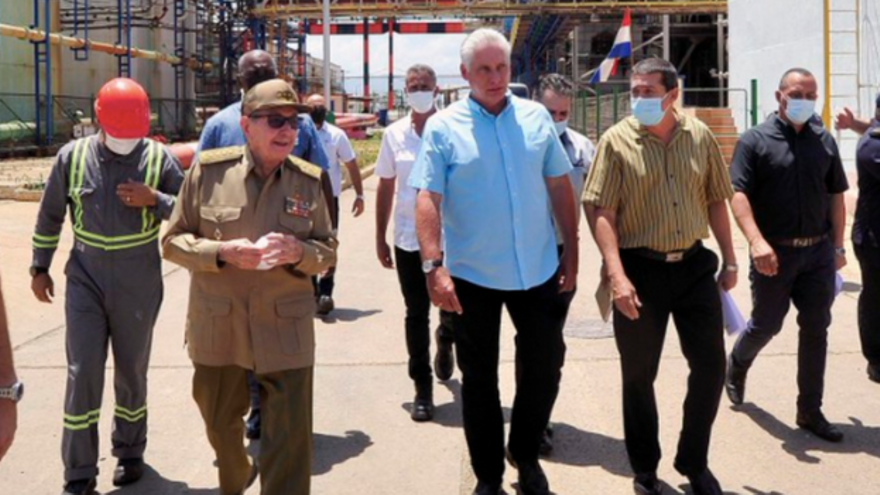
![]() 14ymedio, Havana, 30 August 2022 — The Antonio Guiteras thermoelectric plant, in Matanzas, left the National Electric System this Tuesday, according to the Cuban Electric Union (UNE), “due to losses of turbine parameters (empty).” Although the state company then assured that “work will be done immediately on the solution to the leak in the boiler that had already been detected previously,” the news, in any case, further casts a shadow over the announcement made by President Miguel Díaz-Canel this Monday: that the blackouts will end in December.
14ymedio, Havana, 30 August 2022 — The Antonio Guiteras thermoelectric plant, in Matanzas, left the National Electric System this Tuesday, according to the Cuban Electric Union (UNE), “due to losses of turbine parameters (empty).” Although the state company then assured that “work will be done immediately on the solution to the leak in the boiler that had already been detected previously,” the news, in any case, further casts a shadow over the announcement made by President Miguel Díaz-Canel this Monday: that the blackouts will end in December.
That date would look promising if it were not for the fact that the same man stated last May that the energy situation would improve before the start of June, while just last week, on State TV’s Roundtable program, industry officials warned that the “complexity” would last at least a year.
Together with Díaz-Canel, Raúl Castro went for a walk through the Lidio Ramón Pérez thermoelectric plant, in Felton, in Mayarí. The general stood to the right of his successor during the tour of the Holguin center as a more-than-necessary support-cane for the leader.
“Felton 1 decides today the course of the recovery strategy, and its start-up is vital for the fulfillment of the outlined objectives, first, to minimize or eliminate blackouts by next December,” Díaz-Canel said.
Edier Guzmán Pacheco, director of thermal generation of the Electric Union (UNE) explained that since the beginning of August, a program is being carried out that should solve the problems of the plant this summer, with a view to starting the production and startup of the unit “very soon.”
To this end, technical modifications have been made to the machinery and the auxiliary systems, in addition to tests that guarantee “the stability, reliability and efficiency of the equipment.”
Felton, the Holguin energy colossus, with the capacity to supply about 500 MW, had a breakdown in the boiler of unit 1 at the end of July that caused its exit from the National Electrical System, while unit 2 has been disabled since it suffered a major fire at the beginning of the same month.
The machinery of the first unit, which is being repaired, must reach, according to the director of the plant, Euclides Rodríguez Mejías, 260 MW. “It would be a positive injection and would significantly reduce the effects on the population,” he said.
“We’re going to have the support we need in Felton,” Rodríguez told the official press. “It’s a commitment, but Felton is ready to take it on.”
With regard to block 2, the project manager, Eric Milanés Quinzán, said that its structure has been dismantled by 8%, and work will be done on the reconstruction of the boiler and maintenance of the high-medium cylinder of the turbine, as well as the incorporation of various equipment.
Díaz-Canel, who had also visited the Santiago de Cuba power plant, explained that the task is not only focused on quickly repairing the failures to overcome the power cuts of up to 12 and 14 hours, which has pushed citizens to their limits, but also about stabilizing the system with investments that will arrive in 2023 and change the electro-energy matrix.
These investments and their acquisition are, in the opinion of the Cuban economist living in Spain, Elías Amor, one of the possible reasons that led Raúl Castro to place himself yesterday, at the age of 90, next to his dauphin. “That Raúl Castro shows his face can be a warning for those foreign investors who scan their memories with the Castros from their offices in Madrid or Paris,” says the expert, who warns of Díaz-Canel’s low media attractiveness for businessmen who “in their youth had communist ideas and now, at the head of large corporations, feel a sickly attraction to the Cuban regime.”
And the economist considers that there is another important reason: to express the Army’s support for the head of state and, therefore, the risks faced by citizens who protest the blackouts.
“Díaz-Canel will feel calmer having obtained the explicit support of Raúl Castro, so any maneuver to relieve him of the post has been put on hold until further notice,” he adds. “The Cuban communists thus lose political initiative, if they ever had it, and instead of concentrating on changing things and preparing a viable future for Cuba, they concentrate on technical programs to solve the failures that took the different units of the power plants out of service, so they don’t raise their heads. Order and discipline, Raúl Castro’s eternal song.”
Meanwhile, the population remains desperate, and this Monday the week began with a deficit of 36%, with a generation of 2,280 MW for a maximum demand of 3,100 MW. The UNE predicted that up to 890 MW would be missing during the highest consumption period.
Translated by Regina Anavy
____________
COLLABORATE WITH OUR WORK: The 14ymedio team is committed to practicing serious journalism that reflects Cuba’s reality in all its depth. Thank you for joining us on this long journey. We invite you to continue supporting us by becoming a member of 14ymedio now. Together we can continue transforming journalism in Cuba.
